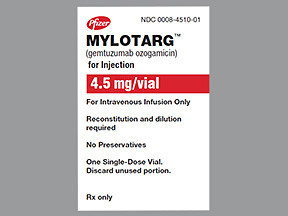GEMTUZUMAB OZOGAMICIN - INJECTION
PHONETIC PRONUNCIATION: (jem-TOOZ-ue-mab OH-zoe-ga-MYE-sin)
COMMON BRAND NAME(S): Mylotarg
GENERIC NAME(S): gemtuzumab ozogamicin
Uses
USES: This medication is used to treat a certain type of leukemia (CD33-positive acute myeloid leukemia-AML). This medication works by slowing or stopping the growth of cancer cells.
How to use GEMTUZUMAB OZOGAMICIN - INJECTION
HOW TO USE: This medication is given by slow injection into a vein as directed by your doctor, usually over 2 hours. To decrease the risk of side effects, your doctor may give you other medications (such as acetaminophen, diphenhydramine) before your injection. The dosage and treatment schedule are based on your medical condition, response to treatment, and body size. To get the most benefit from this medication, do not miss any doses. To help you remember, mark the days on the calendar when you need to receive the medication.
Side Effects
Precautions
Interactions
Overdose
Images
Reviews
Faq for GEMTUZUMAB OZOGAMICIN - INJECTION
- Gemtuzumab ozogamicin is used to treat a type of acute myeloid leukemia (AML) that has a certain specific genetic mutation.
- Gemtuzumab ozogamicin works by binding to a protein called CD33 on the surface of leukemia cells, which helps deliver a toxic substance that kills the cancer cells.
- Common side effects of gemtuzumab ozogamicin include fever, nausea, vomiting, headache, fatigue, constipation, and low platelet count.
- Gemtuzumab ozogamicin is given as an intravenous (IV) infusion, usually over a few hours. The specific dosage and schedule will depend on your individual condition and response to the treatment.
- It is important to inform your doctor about any allergies, other medical conditions, medications you are taking (including over-the-counter and herbal products), and if you are pregnant or planning to become pregnant. Your doctor will also need to know if you have previously received any chemotherapy or radiation therapy.
- Gemtuzumab ozogamicin may interact with certain anticoagulant medications (e.g., warfarin), and it is important to inform your doctor about all the medications you are taking to avoid any potential interactions.
- Gemtuzumab ozogamicin can cause serious infusion reactions, liver toxicity, and an increased risk of hemorrhage. Your doctor will closely monitor you during treatment and provide necessary precautions and warnings.
- The duration of treatment with gemtuzumab ozogamicin can vary depending on individual response and the treatment plan determined by your doctor. It is important to follow the treatment schedule prescribed by your doctor.
- Gemtuzumab ozogamicin is not approved for use in children. It is generally indicated for adults with specific types of AML.
Warning
WARNING: This medication may cause very serious (even fatal) liver damage, including a certain type known as veno-occlusive disease (VOD). The risk is increased with higher doses, or if you already have liver problems, or if you have had a bone marrow transplant. Careful monitoring by your doctor may decrease your risk. Tell your doctor right away if you develop nausea/vomiting that doesn't stop, loss of appetite, stomach/abdominal pain, yellowing eyes/skin, dark urine, swelling abdomen, sudden weight gain. Your doctor may change your dosage schedule or stop treatment with this medication if you develop VOD.
Disclaimer
IMPORTANT: HOW TO USE THIS INFORMATION: This is a summary and does NOT have all possible information about this product. This information does not assure that this product is safe, effective, or appropriate for you. This information is not individual medical advice and does not substitute for the advice of your health care professional. Always ask your health care professional for complete information about this product and your specific health needs.

No Reviews Yet